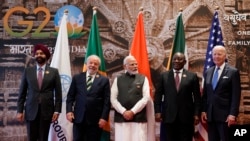The White House on Saturday hailed this year’s G20 summit as a success, saying the final communique contains “consequential paragraphs” on Russia’s invasion of Ukraine — despite the notable omission of the word “Russia” in those paragraphs, which drew sharp criticism from Ukraine’s government.
National Security Adviser Jake Sullivan described the agreement — reached on the first day of the meeting in New Delhi — as a “significant milestone for India’s chairmanship and a vote of confidence that the G20 can come together to address a pressing range of issues.”
The summit was also notable for the absence of two key leaders — Russian President Vladimir Putin and Chinese President Xi Jinping. Both were represented by senior officials.
“The G20 statement includes a set of consequential paragraphs on the war in Ukraine,” Sullivan told reporters. “And from our perspective, it does a very good job of standing up for the principle that states cannot use force to seek territorial acquisition.”
The 29-page communique spanned issues that included trade, economic growth and development, climate change, reform of multilateral institutions, technology, taxation and gender equality. In it, leaders of the Group of 20 major and developing economies called for a “comprehensive, just, and durable peace in Ukraine” — but stopped short of naming Russia as the aggressor. The group also agreed that the use of nuclear weapons is “inadmissible.”
“By removing the word ‘Russia,’ and the word ‘aggression,’ they gave Mr. Putin a face-saving gesture, and will now wait and see if he then reciprocates by doing what all G20 members except him agreed to,” said Professor John Kirton, who heads the G20 Research Group at the University of Toronto. “And that's getting out of all of Ukraine.”
In a Facebook post, Ukraine’s foreign ministry spokesman, Oleg Nikolenko, said, “Ukraine is grateful to the partners who tried to include strong wordings in the text.”
He also offered a heavily edited version of the communique, rewriting the statement “There were different views and assessments of the situation” as “On Russia’s war of aggression against Ukraine, members of the G20 unequivocally condemned it and called on Moscow to immediately end it.”
At the start of the New Delhi summit, Indian Prime Minister Narendra Modi urged consensus.
“Today, as the president of G20, India calls upon the entire world to first convert this global trust deficit into faith,” he said. “It is time for all of us to move together."
Washington’s argument for supporting Ukraine hinged on the significant economic consequences of the conflict, the White House told VOA.
“The war in Ukraine has put a huge strain on lower- and middle-income countries when it comes to food security, energy security, inflationary pressure. You can't discount the effect that Mr. Putin's war has had on the global economy,” John Kirby, director of strategic communications for the National Security Council, told VOA on the summit’s sidelines in New Delhi.
“And what the president wants to pursue — and he'll mention the war in Ukraine specifically as he pursues this — are opportunities for these lower- and middle-income countries to be able to pursue investment opportunities and loans for infrastructure development that are high quality, that are transparent, and that will really meet their local needs as best as possible,” Kirby said.
But Kirton said the leaders of the world’s 20 premier economies could have been much bolder, especially in regard to combating climate change.
On that topic, the communique said, “Mindful of our leadership role, we reaffirm our steadfast commitments, in pursuit of the objective of UNFCCC, to tackle climate change by strengthening the full and effective implementation of the Paris Agreement and its temperature goal, reflecting equity and the principle of common but differentiated responsibilities and respective capabilities, in light of different national circumstances.”
UNFCCC is the United Nations Framework Convention on Climate Change.
“We live in a world full of summits — G20, G7,” Kirton said. “We've got four U.N. summits to come in New York in the next few weeks. [U.S. President] Joe Biden is planning a summit of the future next year. But what's the point if you just get these fine communiques, these fine promises as well: ‘we commit to,’ ‘we agree,’ and then nothing gets done once leaders go home?”
